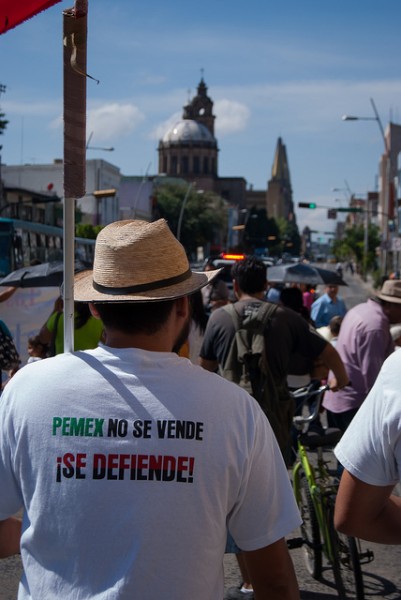Mexico's Senate has approved an energy reform bill that will end a 75-year state oil monopoly established under Presidente Lázaro Cárdenas (1934-1940), who expropriated the assets of British and U.S. oil companies in order to forge one of the largest state oil monopolies in the world. The reform was approved in the early morning hours of December 12, 2013, after a chamber session lasting some 20 hours.
The energy reform bill lays the groundwork for a regulatory framework that will permit the investment of private Mexican and foreign capital for the first time in decades, making it the most important economic overhaul since the adoption of the North American Free Trade Agreement (NAFTA).
The new legislation will change Mexico's charter, enabling corporations such as Exxon Mobil and Chevron to undertake exploration in an area with the largest crude reserves after those in the Arctic Circle. The parties supporting the reform (PRI, PAN, Nueva Alianza and Verde) say that the measure will propel Mexico into the ranks of the top five oil exporting nations; those against the bill say it will channel profits directly into the pockets of investors.
According to Bank of America‘s chief economist in Mexico, Carlos Capistran, speaking by telephone to Bloomberg: “The reform will provide the Mexican economy with energy.”
A cornerstone of Peña Nieto's program
The reform was green-lit at the close of a year in which President Enrique Peña Nieto and his Institutional Revolutionary Party (PRI) won back the reigns of power after a 12-year absence.
The 47-year old head-of-state declared the energy sector would be the cornerstone of his administration, followed by educational reform aimed at assessing teacher performance, and a law to improve competitiveness in the telecommunications sector by means of increased lending.
Ever since the free trade agreement with Canada and the United States came into effect in 1994, México has become one of the worlds most open economies. However, many industrial sectors continue to be dominated by individuals and conglomerates such as that of the billionaire Carlos Slim.
Traitors to the Nation
The leftist parties (PRD [es], PT, Movimiento Ciudadano [es]) accused the legislators who voted in favour of the constitutional changes of being “traitors to the nation,” asserting that those who support the bill were delivering not just the oil but the country's energy wealth.
It is a 180-degree turn from the existing 75-year old legislation. The oil expropriation of 1938, decreed by then president Lázaro Cárdenas, gave the state exclusive rights to energy production.
The reform amends articles 25, 27 and 28 of the Constitution, to allow the state to enter into contracts with both Mexican and foreign private entities. Moreover, it will enable Mexico to strike deals with companies regarding service, shared use and production, and licensing agreements; and in each case, the payment structure will vary.
Antonio García, a legislator from the PRD, stripped down to his underwear [es] while he voiced his criticism of the energy reform bill. Karen Quiroga, also of the PRD, had an altercation with Landy Berzunza of the PRI, who rebuked the leftist legislators during their vote, going so far as to turn and make a crude gesture at opposition members. This culminated in a physical confrontation when Quiroga attempted to approach the area in which members present their objections, and Berzunza tried to stop her. The pair came to blows and the PRD congresswoman injured her opponent's left eye.
Public Sentiment
The Mexican public has issued a call to citizens to take to the streets of Mexico City to protest the energy bill approved by the Senate.
The youth movement YoSoy132, for example, encouraged people to join demonstrations against the reform:
HOY! 4pm #TodosALasCalles No nos representas @ManceraMiguelMX pic.twitter.com/Xw7yJdF7bm
— #YoSoy132 (@Soy132MX) diciembre 14, 2013
TODAY! 4pm #TodosALasCalles [everyone to the streets] You don't represent us @ManceraMiguelMX [Mayor of Mexico City]
Valeria Hamel, a member of YoSoy132, tweeted:
La defensa de #Pemex no es monopolio de un partido o grupo. Sal a las calles, ve al Senado. Manifiéstate. #NOalaReformaEnergetica
— Valeria Hamel (@valehamel) diciembre 8, 2013
No single party or group has a monopoly on defending #Pemex. Get out in the street, go to the Senate. Demonstrate. #NOalaReformaEnergetica [No to the energy reform]
Luis Fernando García ironically mentioned the inadequacies of the companies formerly controlled by the state, which are now in the hands of Mexican and foreign investors:
Todas las empresas públicas privatizadas son una maravilla. Vean la puntualidad de Aeroméxico o el Internet en Infinitum de Telmex.
— Luis Fernando García (@tumbolian) diciembre 13, 2013
All privatized public companies are a marvel. Just look at how punctual Aeromexico is or the Internet by Infinitum [Internet service provider] from Telmex.
The Mexican Soul
“The topic of oil is rooted in the soul of Mexico, in the Mexican tradition, in the history of Mexico,” says Jorge Chabat, a political scientist in the Center for Research and Teaching in Economics (CIDE), a university based in Mexico City. As it passed the review process in Congress, it “waged the mother of all battles by the Mexican government and will be one of the major accomplishments of Peña Nieto's administration”, he said in a telephone interview.
Oil production is stagnant, in part because the energy sector has not received the competitive push of NAFTA that other industrial sectors have been given, said Duncan Wood, director of the Mexico Institute at the Washington-based Woodrow Wilson International Center for Scholars.
“What this reform does is to now expose the Mexican energy sector to national and international competition,” said Wood. “This marks a fundamental paradigm shift in the mentality of the energy sector. Today we are moving beyond 1938.”









3 comments